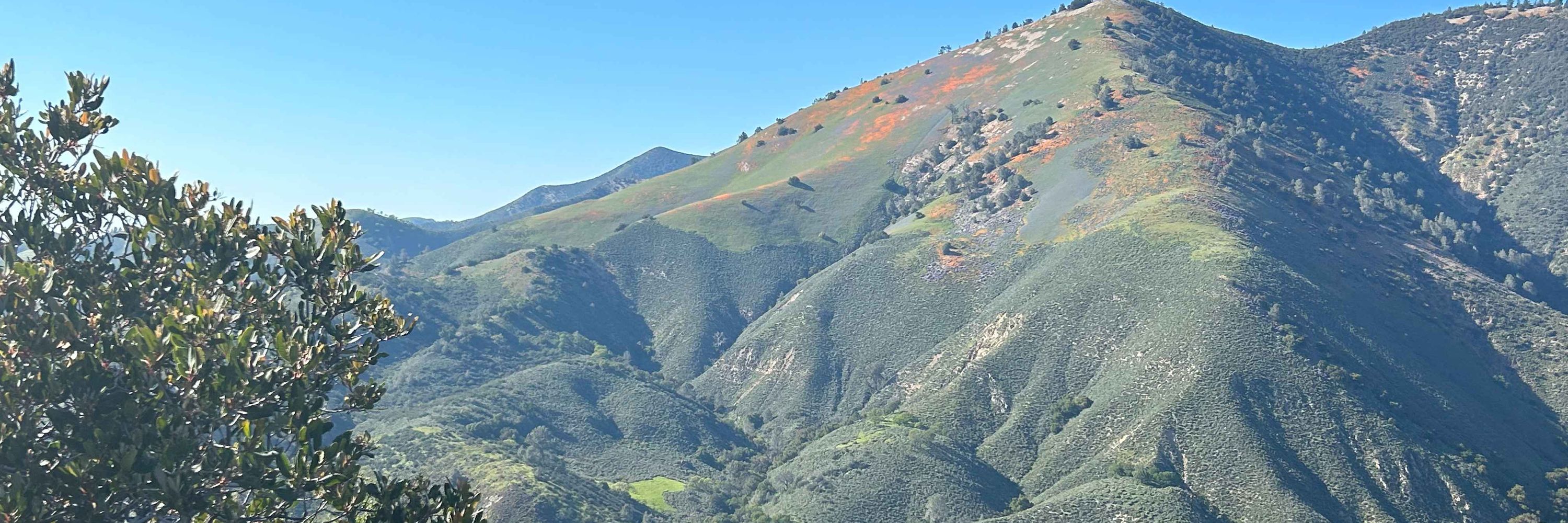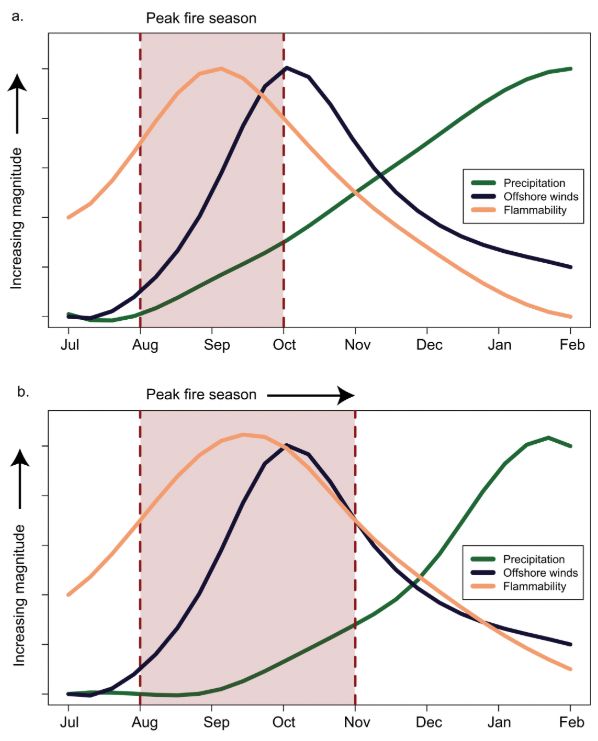
Jacob Levine
@jacoblevine.bsky.social
Wilkes Postdoctoral Fellow at the Wilkes Center for Climate Science and Policy
@UniversityofUtah. Princeton PhD. Berkeley undergrad.
I use theory, experiments and stats to study biodiversity, fire, and forests.
@UniversityofUtah. Princeton PhD. Berkeley undergrad.
I use theory, experiments and stats to study biodiversity, fire, and forests.
Pinned
Jacob Levine
@jacoblevine.bsky.social
· Aug 18
Thrilled to announce that next year I will be joining @DukeBiology as an assistant professor!
I am excited to recruit postdocs and PhD students to start as early as Fall 2026. If you are interested in plant community dynamics, global change, and/or wildfire, please see details below.
I am excited to recruit postdocs and PhD students to start as early as Fall 2026. If you are interested in plant community dynamics, global change, and/or wildfire, please see details below.
I am advertising a postdoctoral position in my new lab at Duke, to start as early as August 2026. If you are interested in how plant communities respond to climate change, please consider applying!
academicjobsonline.org/ajo/jobs/30614
academicjobsonline.org/ajo/jobs/30614

September 24, 2025 at 8:44 PM
I am advertising a postdoctoral position in my new lab at Duke, to start as early as August 2026. If you are interested in how plant communities respond to climate change, please consider applying!
academicjobsonline.org/ajo/jobs/30614
academicjobsonline.org/ajo/jobs/30614
Reposted by Jacob Levine
A new study led by alum @jacoblevine.bsky.social, BS '18 Forestry and EEP, and co-authored by Professor Scott Stephens and research scientist Brandon Collins explores why forests planted for logging purposes fuel devastating wildfires more often than untouched land. www.latimes.com/environment/...

Private land used for logging is more prone to severe fire than public lands. A new study shows why
New research explains why forests planted for logging purposes fuel devastating wildfires more often than untouched land.
www.latimes.com
August 29, 2025 at 6:03 PM
A new study led by alum @jacoblevine.bsky.social, BS '18 Forestry and EEP, and co-authored by Professor Scott Stephens and research scientist Brandon Collins explores why forests planted for logging purposes fuel devastating wildfires more often than untouched land. www.latimes.com/environment/...
Great to see our work in my hometown paper!
Its not logging itself thats the issue, its what happens after -- dense plantations are responsible for elevated fire severity in industrial forests.
Excellent story by @nohaggerty.bsky.social.
www.latimes.com/environment/...
Its not logging itself thats the issue, its what happens after -- dense plantations are responsible for elevated fire severity in industrial forests.
Excellent story by @nohaggerty.bsky.social.
www.latimes.com/environment/...

Private land used for logging is more prone to severe fire than public lands. A new study shows why
New research explains why forests planted for logging purposes fuel devastating wildfires more often than untouched land.
www.latimes.com
August 21, 2025 at 7:35 PM
Great to see our work in my hometown paper!
Its not logging itself thats the issue, its what happens after -- dense plantations are responsible for elevated fire severity in industrial forests.
Excellent story by @nohaggerty.bsky.social.
www.latimes.com/environment/...
Its not logging itself thats the issue, its what happens after -- dense plantations are responsible for elevated fire severity in industrial forests.
Excellent story by @nohaggerty.bsky.social.
www.latimes.com/environment/...
Had a great time chatting with Jericka Duncan on @cbsnews.com.web.brid.gy last night about our new study on increased fire severity in industrial forest plantations.
You can watch it here!
www.cbsnews.com/video/megafi...
You can watch it here!
www.cbsnews.com/video/megafi...

Megafires more likely to occur on private land than public forests, study finds
More than 44,000 fires have burned nearly 4 million acres across the U.S. so far in 2025, according to the National Interagency Fire Center, but only a handful have been megafires. A new study found t...
www.cbsnews.com
August 21, 2025 at 1:37 PM
Had a great time chatting with Jericka Duncan on @cbsnews.com.web.brid.gy last night about our new study on increased fire severity in industrial forest plantations.
You can watch it here!
www.cbsnews.com/video/megafi...
You can watch it here!
www.cbsnews.com/video/megafi...
Reposted by Jacob Levine
🧵1/7
🔥 Want to know why megafires are growing bigger? A new study shows industrial private forests are 1.5× more likely to burn in high-severity wildfires than public forests. Mismanaged fuel beds help fires spread.
🔥 Want to know why megafires are growing bigger? A new study shows industrial private forests are 1.5× more likely to burn in high-severity wildfires than public forests. Mismanaged fuel beds help fires spread.

Industry managed forests more likely to fuel megafires, study finds
The odds of high-severity wildfire were nearly one-and-a-half times higher on industrial private land than on publicly owned forests, a new study found. Forests managed by timber companies were more l...
phys.org
August 20, 2025 at 4:47 PM
🧵1/7
🔥 Want to know why megafires are growing bigger? A new study shows industrial private forests are 1.5× more likely to burn in high-severity wildfires than public forests. Mismanaged fuel beds help fires spread.
🔥 Want to know why megafires are growing bigger? A new study shows industrial private forests are 1.5× more likely to burn in high-severity wildfires than public forests. Mismanaged fuel beds help fires spread.
Reposted by Jacob Levine
Industrial logging is not the kind of selective thinning that lowers the risk of intense wildfires
www.sfchronicle.com/california-w...
The open-access paper, not linked in the news coverage, is here
onlinelibrary.wiley.com/doi/10.1111/...
www.sfchronicle.com/california-w...
The open-access paper, not linked in the news coverage, is here
onlinelibrary.wiley.com/doi/10.1111/...

Does logging reduce wildfire danger? New California study finds key exception
Private timberlands in Northern California are more likely to see high-severity wildfire than areas in and around public forests, a new study found.
www.sfchronicle.com
August 20, 2025 at 4:18 PM
Industrial logging is not the kind of selective thinning that lowers the risk of intense wildfires
www.sfchronicle.com/california-w...
The open-access paper, not linked in the news coverage, is here
onlinelibrary.wiley.com/doi/10.1111/...
www.sfchronicle.com/california-w...
The open-access paper, not linked in the news coverage, is here
onlinelibrary.wiley.com/doi/10.1111/...
Excited to see our work on 🔥 in industrial forests featured in the @sfchronicle.com this morning.
Article by @kurtisalexander.bsky.social:
www.sfchronicle.com/california-w...
Article by @kurtisalexander.bsky.social:
www.sfchronicle.com/california-w...
Does logging reduce wildfire danger? New California study finds key exception
Private timberlands in Northern California are more likely to see high-severity wildfire than areas in and around public forests, a new study found.
www.sfchronicle.com
August 20, 2025 at 4:46 PM
Excited to see our work on 🔥 in industrial forests featured in the @sfchronicle.com this morning.
Article by @kurtisalexander.bsky.social:
www.sfchronicle.com/california-w...
Article by @kurtisalexander.bsky.social:
www.sfchronicle.com/california-w...
🔥🔥🔥 Why are wildfires more severe in private industrial forests?
Our new paper in @globalchangebio.bsky.social has the answers:
onlinelibrary.wiley.com/doi/10.1111/...
🧵 Thread below
Our new paper in @globalchangebio.bsky.social has the answers:
onlinelibrary.wiley.com/doi/10.1111/...
🧵 Thread below

Extreme Weather Magnifies the Effects of Forest Structure on Wildfire, Driving Increased Severity in Industrial Forests
Wildfires are consistently more severe in private industrial forests than public ones. In this paper, we identify the drivers of this pattern. Namely, we show that fire severity is elevated in dense,...
onlinelibrary.wiley.com
August 20, 2025 at 3:54 PM
🔥🔥🔥 Why are wildfires more severe in private industrial forests?
Our new paper in @globalchangebio.bsky.social has the answers:
onlinelibrary.wiley.com/doi/10.1111/...
🧵 Thread below
Our new paper in @globalchangebio.bsky.social has the answers:
onlinelibrary.wiley.com/doi/10.1111/...
🧵 Thread below
Thrilled to announce that next year I will be joining @DukeBiology as an assistant professor!
I am excited to recruit postdocs and PhD students to start as early as Fall 2026. If you are interested in plant community dynamics, global change, and/or wildfire, please see details below.
I am excited to recruit postdocs and PhD students to start as early as Fall 2026. If you are interested in plant community dynamics, global change, and/or wildfire, please see details below.
August 18, 2025 at 7:41 PM
Thrilled to announce that next year I will be joining @DukeBiology as an assistant professor!
I am excited to recruit postdocs and PhD students to start as early as Fall 2026. If you are interested in plant community dynamics, global change, and/or wildfire, please see details below.
I am excited to recruit postdocs and PhD students to start as early as Fall 2026. If you are interested in plant community dynamics, global change, and/or wildfire, please see details below.
Excited to share our new paper out now in Ecological Monographs!
"Trait diversity in plant communities maintained by competition for water and light"
@ecologicalsociety.bsky.social
esajournals.onlinelibrary.wiley.com/doi/full/10....
"Trait diversity in plant communities maintained by competition for water and light"
@ecologicalsociety.bsky.social
esajournals.onlinelibrary.wiley.com/doi/full/10....

Trait diversity in plant communities maintained by competition for water and light
Ecological communities frequently exhibit remarkable taxonomic and trait diversity, and this diversity is consistently shown to regulate ecosystem function and resilience. However, ecologists lack a ...
esajournals.onlinelibrary.wiley.com
April 14, 2025 at 6:51 PM
Excited to share our new paper out now in Ecological Monographs!
"Trait diversity in plant communities maintained by competition for water and light"
@ecologicalsociety.bsky.social
esajournals.onlinelibrary.wiley.com/doi/full/10....
"Trait diversity in plant communities maintained by competition for water and light"
@ecologicalsociety.bsky.social
esajournals.onlinelibrary.wiley.com/doi/full/10....
Had a great time chatting with Ross Chambless on Talking Climate last week! The episode is out now -- we talk about my work on biodiversity, climate change, and wildfire. @wilkescenter.bsky.social
podcasts.apple.com/us/podcast/t...
podcasts.apple.com/us/podcast/t...

29: How Are Plant Ecosystems Adapting to the Shifting Climate?
Podcast Episode · Talking Climate · 02/25/2025 · 44m
podcasts.apple.com
February 25, 2025 at 10:59 PM
Had a great time chatting with Ross Chambless on Talking Climate last week! The episode is out now -- we talk about my work on biodiversity, climate change, and wildfire. @wilkescenter.bsky.social
podcasts.apple.com/us/podcast/t...
podcasts.apple.com/us/podcast/t...
Reposted by Jacob Levine
Here's a schematic I published in this 2021 piece to illustrate how even a modest delay in onset of rainy season in Southern California can dramatically amplify wildfire risk by lengthening seasonal overlap between dry vegetation and strong offshore winds during Oct-Jan. #CAfire

January 10, 2025 at 1:45 AM
Here's a schematic I published in this 2021 piece to illustrate how even a modest delay in onset of rainy season in Southern California can dramatically amplify wildfire risk by lengthening seasonal overlap between dry vegetation and strong offshore winds during Oct-Jan. #CAfire
As part of my migration to bluesky, I'm excited to share a recent article published in Trends in Ecology and Evolution where we explain ecologists' struggles to predict coexistence from species' functional traits:
www.sciencedirect.com/science/arti...
www.sciencedirect.com/science/arti...

Why ecologists struggle to predict coexistence from functional traits
The rationale behind trait-based ecology is that shifting focus from species’ taxonomic names to their measurable characteristics (‘functional traits’…
www.sciencedirect.com
December 16, 2024 at 5:43 PM
As part of my migration to bluesky, I'm excited to share a recent article published in Trends in Ecology and Evolution where we explain ecologists' struggles to predict coexistence from species' functional traits:
www.sciencedirect.com/science/arti...
www.sciencedirect.com/science/arti...

